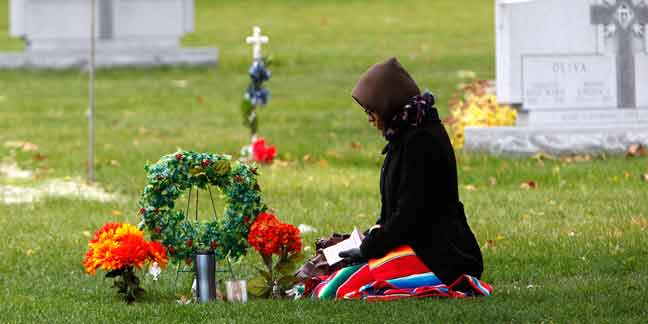 Pre-planning is making your cemetery and funeral arrangements prior to your death. This allows your wishes to be known, thus eliminating an incredible burden on your loved ones during the very stressful and painful hours after your death. Pre-planning is a concrete sign of your love for surviving family members.
Pre-planning is making your cemetery and funeral arrangements prior to your death. This allows your wishes to be known, thus eliminating an incredible burden on your loved ones during the very stressful and painful hours after your death. Pre-planning is a concrete sign of your love for surviving family members.
What are the benefits of pre-planning?
The most obvious benefit is that you will relieve your loved ones of the burden of making your cemetery and funeral arrangements at a time of tremendous grief. Your advance planning will give your family the guidance they need to feel comfortable that they are carrying out the decisions you made.
Pre-planning may prevent disagreement among survivors at an emotionally charged time and can assure that emotional over-spending does not occur. By pre-planning and pre-funding cemetery and funeral arrangements, you may be creating exempt assets should you ever have to go on public assistance.
The costs of cemetery property have been escalating at the rate of 100 percent every 10 years. By purchasing in advance, you are locking in today’s pricing.
At what age should I consider pre-planning cemetery and funeral arrangements?
Adults of any age who make their own decisions should have a plan. Like your will, it can be revised throughout your life as needs change. In general, the earlier you preplan the more options you have. Your cemetery and funeral options will probably never cost less than they do today. Statistic show that 43 percent of all deaths are unexpected; we are not guaranteed any tomorrows.
In our culture, few families are comfortable discussing death and loss. This is just one of those things that does not get easier as time goes by. Now is the best time for you to get your plan in order.
Why should I choose to be buried in a Catholic cemetery?
First and foremost, Catholic cemeteries are a vital part of our Church’s heritage of caring for and burying the bodies of the dead in blessed ground — one of the corporal works of mercy.
Can I donate my body to a university?
Yes. But you must be sure that the body will be buried properly when the experimentations are completed. In this case a Mass should be offered for the deceased.
What is the ordinary manner of preparing for death and burial?
- Save and/or purchase insurance to properly provide for a casket, funeral services and burial.
- Remember that the Church desires the full body to be present for the Mass of Christian Burial and for the body to be buried in a cemetery.
- Leave instructions that someone will call the priest when death seems close.
- Ensure that someone will call the priest for the last rites (confession, anointing and Communion) before death.
- Ensure that someone will call the priest when death occurs.
- The Prayers for the Dead are to be prayed.
- The body is prepared for burial by family or the funeral directors.
- Arrange for someone to meet with the funeral director to begin preparing for the funeral rites.
— “Catholic Funeral Guide,” St. Michael the Archangel Church in Gastonia
How should I prepare for a good death?
- Live a Catholic sacramental life.
- Develop a Catholic understanding of life and death.
- Pray to St. Joseph, patron of happy deaths.
- Develop an understanding of the Catholic funeral rites.
- Prepare with a good confession, the anointing of the sick, and Communion as “Viaticum.” Make sure someone calls the priest. If you are going to have surgery which requires general anesthetic, ask the priest to hear your confession and administer the sacrament of the sick before you go to the hospital.
- If you are going to be in the hospital or any nursing care facility, be sure to list the parish priest, deacon and others from the parish whom you wish to visit; otherwise, they will not be able.
- Make advanced plans with your parish priest for the funeral rites; read the policies of your parish for funerals.
- Save for the expenses of a proper Catholic funeral; most people have insurance policies for this.
- Talk with family members and your attorney. Be sure your legal documents give a Catholic understanding of caring for the sick and dying. Be sure your Will provides for food and water to be given until you cannot assimilate it as a part of ordinary care when appropriate. Appropriate ordinary means of life support should also be given where there is hope of cure. Think of appointing a Health Care Power of Attorney with your instructions to be followed.
- Make provisions for your funeral in your will; remember that your requests must be in agreement with your parish priest and the Church.
- Contact a funeral home to make pre-arrangements.
- Purchase a burial site.
— “Catholic Funeral Guide,” St. Michael the Archangel Church in Gastonia
Helpful forms
For more information
At www.ncbfs.org: Learn more about preneed funeral trusts, funeral insurance, cremation vs. burial costs, and more
See a list of local parishes’ funeral planning guides here.
Use these worksheets as a tool to discern your wishes and discuss your plans with your family, a funeral home, or your parish. These are general forms meant for use as a general guideline; please check with your parish or go here for a list of local parishes with specific funeral guides.

